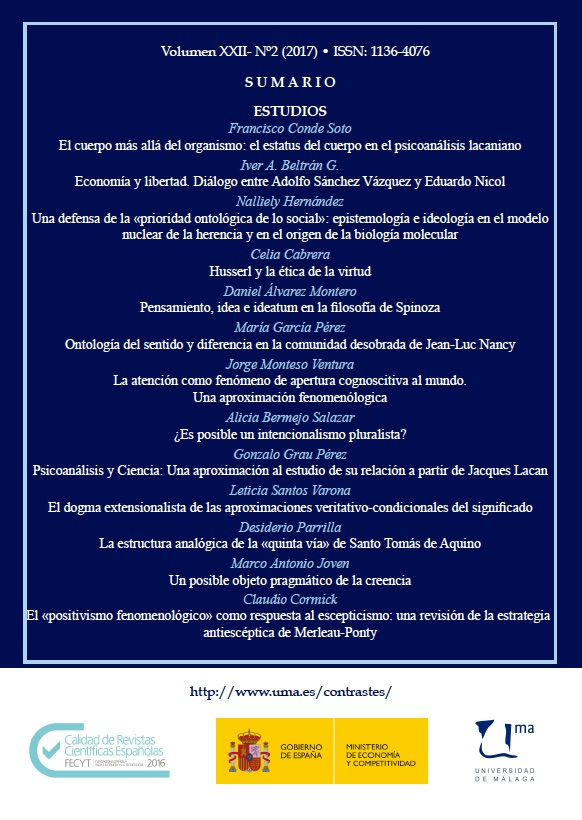Attention as a phenomenonof cognoscitive opening to the world.A phenomenological approach
DOI:
https://doi.org/10.24310/Contrastescontrastes.v22i2.3478Keywords:
Attention, Perception, Reality, World, Phenomenology.Abstract
Attention is a cognitive phenomenon that, for its multiple functions and its permeability to emotional and cultural aspects, it’s a phenomenon with difficult definition. At the same time, the reasons that difficult its definition makes it a fundamental piece to understand the human behaviour, particularly the way that it interacts with its environment. In this article, we want to review the role of attention in the awareness process that allow the subject an adequate adaptation to the environment, and, through it, set his perspective of reality, his own «world».Downloads
Metrics
Publication Facts
Reviewer profiles N/A
Author statements
Indexed in
-
—
- Academic society
- N/A
- Publisher
- Universidad de Málaga
References
AGUSTÍN. (1986). Confesiones. Bogotá: Editorial San Pablo.BI N S WA N G E R, L. (1942). Grundformen und Erkenntnis menschlichen Daseins. Zürich: Max Niehans,.
———, (1955). Das Raumproblem in der Psychopathologie. Ausgewählte Vorträge und Aufsätze. Band II. Bern: Francke Verlag.
CRARY, J. (2008). Suspensiones de la percepción. Atención, espectáculo y cultura moderna. Madrid: Akal.
FREUD, S. (1972). Obras completas. Madrid: Biblioteca Nueva.
GARCÍA LARA, J. E. (2002). Ortega y Gasset y el psicoanálisis. Universidad Complutense de Madrid. [En línea]: http://eprints.ucm.es/4118/HABERMAS, J. (1982). Conocimiento e interés. Madrid: Taurus.
HEIDEGGER, M. (2009). Ser y tiempo. Madrid: Ed. Trotta. HUSSERL, E. (2015). Investigaciones lógicas 1. Madrid: Alianza.
JAMES, W. (1989). Principios de Psicología. vol. 1. México: FCE. LASAGA, J. (2006). Figuras de la vida buena. Ensayo sobre las ideas morales de Ortega y Gasset. Madrid: Enigma, Fundación José Ortega y Gasset.
LUCK E. J. y VECERA, S. P. (2002). Attention. Stevens’ Handbook of Experimental Psychology, vol. 1. Sensation and Perception.
PASHLER, H. y YANTIS, S. (eds.). Nueva York: John Wiley & Sons, Inc., pp. 235-286.
MERLEAU-PON TY, M. (1985). Fenomenología de la percepción. Barcelona: Planeta.
MONTESÓ, J. (2016). Ortega y los predicados culturales de la percepción. Ágora: papeles de filosofía, 35 (2), pp. 157-175.
MORÓN ARROYO, C. (1968). El sistema de Ortega y Gasset. Madrid: Alcalá.
ORTEGA Y GASSET, J. (2004). Meditaciones del Quijote. Obras Completas, I. Ma d r id: Tau r us.
———, (2004). Verdad y perspectiva. Obras Completas, II. Madrid: Taurus.
———, (2004). Vitalidad, alma, espíritu. Obras Completas, II. Madrid: Taurus.
———, (2005). La deshumanización del arte e ideas sobre la novela. Obras Completas, III. Madrid: Taurus.
———, (2006). Estudios sobre el amor. Obras Completas, V. Madrid: Taurus.
———, (2006). Corazón y cabeza. Obras Completas, VI. Madrid: Taurus.
———, (2008). Principios de metafísica según la razón vital. Curso de 1932-1933. Obras Completas, VIII. Madrid: Taurus.
RODRÍGUEZ HUÉSCAR, A. (1985). Perspectiva y verdad. Madrid: Alianza.
SAN MARTÍN, J. (2007). Vocación y profesión: Bases orteguianas para una ética del futuro. En CEREZO GALÁN, P. (Ed.). Ortega en perspectiva. Madrid: Instituto de España, pp. 89-112
———, (2008). La percepción como interpretación. Investigaciones fenomenológicas, 6, pp. 13-32.
———, (2 012). La fenomenología de Ortega y Gasset, Madrid: Biblioteca Nueva.SCHAPP, W. (1910) Beiträge zur Phänomenologie der Wahrnehmung. Gotinga: M. Niemeyer, Halle/S.SCHELER, M. F. (1926). Die Wissensformen und die Gesellschaft. Leipzig: Der Neue Geist Ve rlag.
———, (2 0 01).Ética: nuevo ensayo de fundamentación de un personalismo ético. Madrid: Caparrós.
SERRANO DE HARO, A. (2013). Apariciones y eclipses del cuerpo propio. En ZAMORA BONILLA, J. (Ed.). Guía Comares de Ortega y Gasset. Granada: Ed. Comares, pp. 311-327.
———, (2010). Atención y dolor. Cuerpo Vivido. Madrid: Ed. Encuentro, pp. 123-161.
STYLES, E. A. (2010). La psicología de la atención. Madrid: Ed. Ramón Areces.
VYGOTSK I, L. S. y LURIA, A. R. (2007)El instrumento y el signo en el desarrollo del niño. Madrid: Fundación Infancia y aprendizaje.
Downloads
Published
How to Cite
Issue
Section
License
This journal provides immediate free access to its content under the principle of making research freely available to the public. All content published in Contrastes. Revista Internacional de Filosofía, are subject to the Creative Commons Attribution-NonCommercial-ShareAlike 4.0 license whose full text can be found at <http://creativecommons.org/licenses/by-nc-sa/4.0>
It is the responsibility of the authors to obtain the necessary permissions of the images that are subject to copyright.
Authors whose contributions are accepted for publication in this journal will retain the non-exclusive right to use their contributions for academic, research and educational purposes, including self-archiving or repository in open access repositories of any kind.
The electronic edition of this magazine is edited by the Editorial Service of the University of Malaga (Uma Editorial), being necessary to cite the origin in any partial or total reproduction.










5.png)
